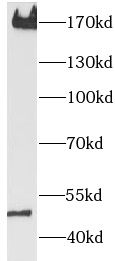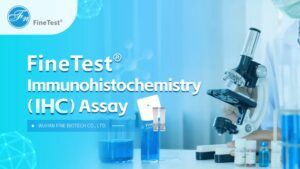Products
PDGFRB antibody
Category:
Research Area:
- SPECIFICATIONS
- Product Name
- PDGFRB antibody
- Catalogue No.
- FNab09972
- Size
- 100μg
- Form
- liquid
- Purification
- Immunogen affinity purified
- Purity
- ≥95% as determined by SDS-PAGE
- Clonality
- polyclonal
- Isotype
- IgG
- Storage
- PBS with 0.02% sodium azide and 50% glycerol pH 7.3, -20℃ for 12 months(Avoid repeated freeze / thaw cycles.)
Immunogen
- Immunogen
- platelet-derived growth factor receptor, beta polypeptide
- Alternative Names
- PDGFR antibody, PDGFR1 antibody
- UniProt ID
- P09619
- Observed MW
- 50 kDa, 160-180 kDa
Application
- Tested Applications
- ELISA, WB, IHC
- Recommended dilution
- WB: 1:200-1:2000; IHC: 1:50-1:200
Validated Images
 mouse lung tissue were subjected to SDS PAGE followed by western blot with FNab09972(PDGFRB antibody) at dilution of 1:1000
mouse lung tissue were subjected to SDS PAGE followed by western blot with FNab09972(PDGFRB antibody) at dilution of 1:1000
 Immunohistochemistry of paraffin-embedded human kidney tissue slide using FNab09972(PDGFRB Antibody) at dilution of 1:100
Immunohistochemistry of paraffin-embedded human kidney tissue slide using FNab09972(PDGFRB Antibody) at dilution of 1:100
- Background
- Tyrosine-protein kinase that acts as cell-surface receptor for homodimeric PDGFB and PDGFD and for heterodimers formed by PDGFA and PDGFB, and plays an essential role in the regulation of embryonic development, cell proliferation, survival, differentiation, chemotaxis and migration. Plays an essential role in blood vessel development by promoting proliferation, migration and recruitment of pericytes and smooth muscle cells to endothelial cells. Plays a role in the migration of vascular smooth muscle cells and the formation of neointima at vascular injury sites. Required for normal development of the cardiovascular system. Required for normal recruitment of pericytes(mesangial cells) in the kidney glomerulus, and for normal formation of a branched network of capillaries in kidney glomeruli. Promotes rearrangement of the actin cytoskeleton and the formation of membrane ruffles. Binding of its cognate ligands-homodimeric PDGFB, heterodimers formed by PDGFA and PDGFB or homodimeric PDGFD-leads to the activation of several signaling cascades; the response depends on the nature of the bound ligand and is modulated by the formation of heterodimers between PDGFRA and PDGFRB. Phosphorylates PLCG1, PIK3R1, PTPN11, RASA1/GAP, CBL, SHC1 and NCK1. Activation of PLCG1 leads to the production of the cellular signaling molecules diacylglycerol and inositol 1,4,5-trisphosphate, mobilization of cytosolic Ca(2+) and the activation of protein kinase C. Phosphorylation of PIK3R1, the regulatory subunit of phosphatidylinositol 3-kinase, leads to the activation of the AKT1 signaling pathway. Phosphorylation of SHC1, or of the C-terminus of PTPN11, creates a binding site for GRB2, resulting in the activation of HRAS, RAF1 and down-stream MAP kinases, including MAPK1/ERK2 and/or MAPK3/ERK1. Promotes phosphorylation and activation of SRC family kinases. Promotes phosphorylation of PDCD6IP/ALIX and STAM. Receptor signaling is down-regulated by protein phosphatases that dephosphorylate the receptor and its down-stream effectors, and by rapid internalization of the activated receptor.



